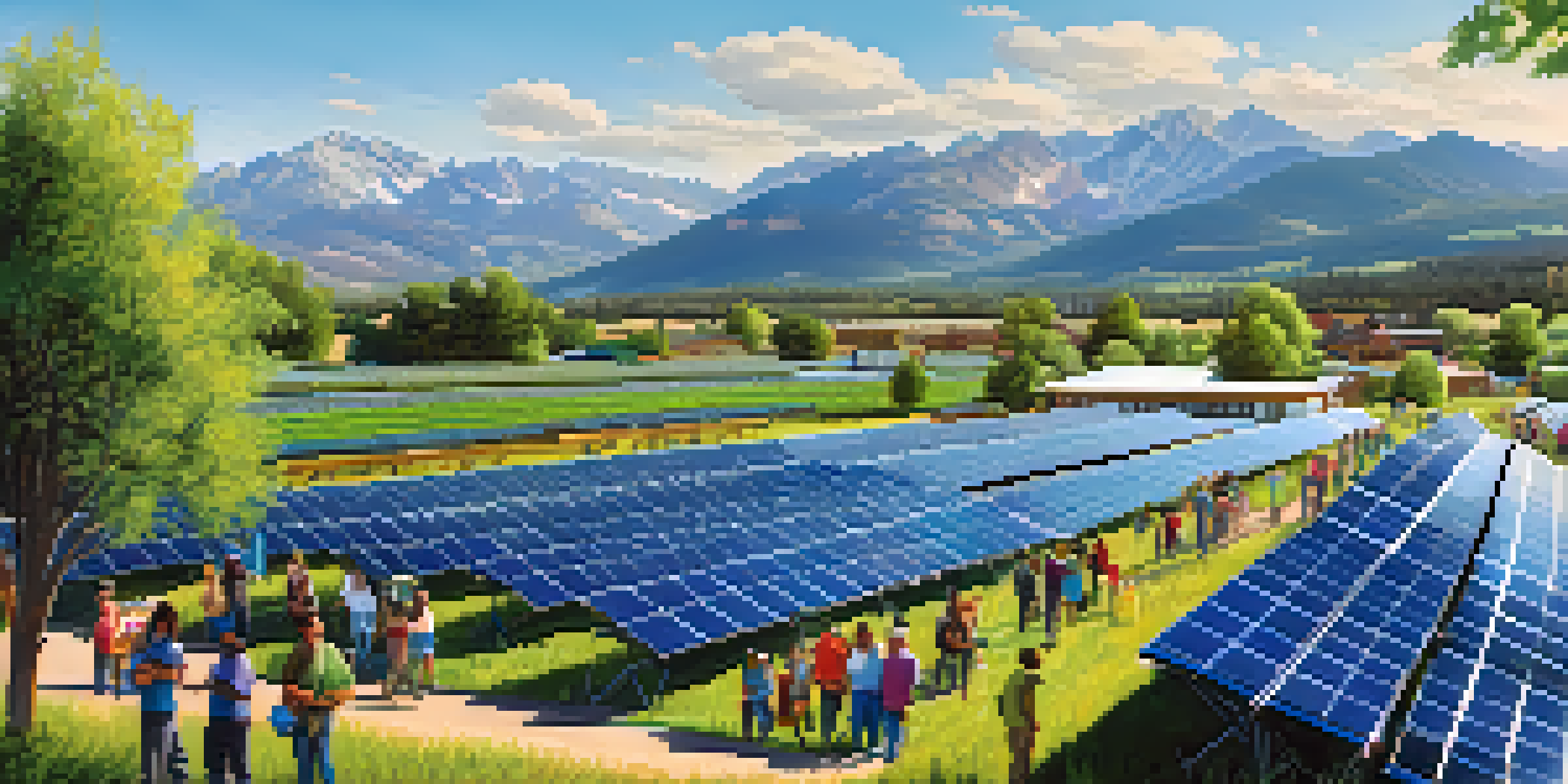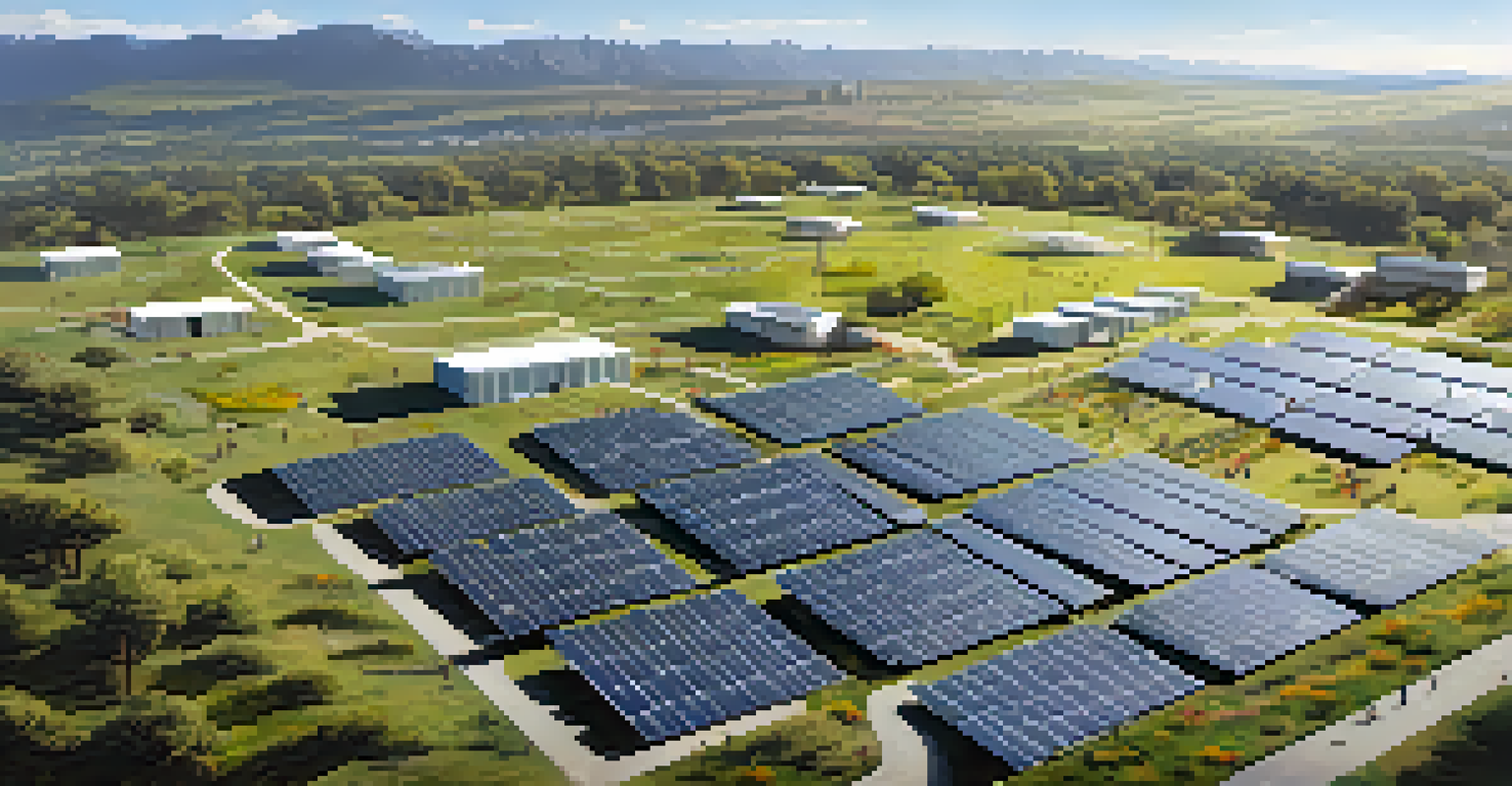Community Solar Gardens: A Bright Future for Colorado

Understanding Community Solar Gardens in Colorado
Community solar gardens are shared solar energy systems that allow multiple participants to benefit from a single solar array. This approach provides an opportunity for individuals and businesses, particularly those unable to install solar panels on their own properties, to engage in renewable energy. By pooling resources, community members can enjoy the benefits of solar power without the upfront costs associated with traditional solar installations.
The sun is the most powerful source of energy we have, and harnessing it can transform our communities and our planet.
These gardens are typically developed on unused land or rooftops and can vary in size, accommodating anywhere from a few households to hundreds. Colorado has embraced this innovative solution, with numerous community solar projects sprouting across the state. This not only promotes clean energy but also fosters a sense of community as members work together for a common goal.
In essence, community solar gardens make solar energy accessible to all, regardless of property ownership or financial capability. They serve as a practical solution to energy equity, ensuring that everyone can participate in the shift toward renewable energy. As more Coloradans learn about these opportunities, the movement toward sustainable energy continues to gain momentum.
The Benefits of Community Solar Gardens
One of the most significant benefits of community solar gardens is their ability to reduce electricity bills for participants. By subscribing to a portion of the solar garden's output, members receive credits on their utility bills based on the energy produced. This translates to immediate savings, making solar energy not just environmentally friendly but also financially advantageous.

Additionally, these gardens contribute to the local economy by creating jobs in construction, maintenance, and management. They also promote energy independence by reducing reliance on fossil fuels. With Colorado aiming to reach ambitious renewable energy goals, community solar gardens play a crucial role in this transition, helping to create a sustainable future.
Community Solar Gardens Boost Access
These shared solar systems allow individuals and businesses to benefit from renewable energy without the need for personal installations.
Furthermore, participating in a community solar garden fosters a sense of pride and belonging. Members can connect with like-minded individuals who share a passion for sustainability and environmental stewardship. This sense of community can lead to further local initiatives and projects aimed at enhancing the region's renewable energy landscape.
Who Can Participate in Community Solar Gardens?
One of the most appealing aspects of community solar gardens is their inclusivity. Anyone, including homeowners, renters, and businesses, can participate as long as they live within the service area of the solar garden. This opens the door for a wide range of individuals to benefit from solar energy, regardless of their living situation or financial status.
Renewable energy is not a choice; it is a necessity for a sustainable future.
For example, renters who may not have the ability to install solar panels on their rooftops can still enjoy the advantages of solar energy by subscribing to a local garden. This is particularly important in urban areas where space is limited, and many residents are looking for sustainable energy solutions that fit their lifestyles.
Moreover, community solar gardens often prioritize low-income households, ensuring that vulnerable communities have access to clean energy. This commitment to inclusivity helps to bridge the gap in energy access and ensures that the transition to renewable energy benefits all members of the community.
How Community Solar Gardens Work
Community solar gardens operate on a straightforward model: a solar array is built in a central location, and participants purchase or lease a portion of the energy produced. This energy is then fed into the local power grid, and participants receive credits on their utility bills proportional to their share of the output. It’s a win-win situation that makes solar energy both accessible and practical.
Once a community solar garden is established, it typically operates for 20 years or more, providing long-term benefits to its members. The maintenance of the solar panels is usually handled by the organization that manages the garden, taking the burden off individual participants. This setup ensures that the solar array remains efficient and productive throughout its lifespan.
Financial and Community Benefits
Participants can reduce their electricity bills while fostering local job creation and a sense of community involvement.
In Colorado, various organizations and utilities are leading the charge in developing community solar gardens. By partnering with local communities, they facilitate the process from planning to implementation, ensuring that everyone can reap the benefits of solar energy. This collaborative approach is key to the success of community solar initiatives.
The Role of Legislation in Community Solar Development
Legislation plays a pivotal role in the growth of community solar gardens in Colorado. The state has implemented policies that encourage the development of these renewable energy projects, making it easier for communities to access solar energy. For instance, Colorado’s community solar gardens program allows for the creation of shared solar facilities, which has spurred numerous projects across the state.
Additionally, incentives and rebates for solar energy projects help to lower the financial barriers for communities looking to invest in solar gardens. These legislative measures not only support the growth of renewable energy but also aim to create a more equitable energy landscape by including low-income households in the transition to solar power.
As the renewable energy landscape continues to evolve, ongoing support from state and local governments will be crucial. By fostering an environment conducive to community solar development, Colorado can lead the way in sustainable energy practices, setting an example for other states to follow.
Challenges Facing Community Solar Gardens
While community solar gardens offer many benefits, they are not without their challenges. One significant hurdle is the initial funding required to establish these projects. Securing investment can be difficult, particularly for smaller communities or organizations. However, many are overcoming this obstacle through creative financing solutions and partnerships.
Another challenge is navigating the regulatory landscape. Each community solar project must comply with local, state, and federal regulations, which can sometimes be complex. This requires thorough planning and coordination among various stakeholders to ensure that all legal requirements are met.
Inclusivity in Renewable Energy
Community solar gardens welcome homeowners, renters, and low-income households, ensuring equitable access to clean energy.
Despite these challenges, the momentum for community solar gardens continues to grow. Innovative solutions and collaborative efforts are paving the way for more projects, allowing communities to overcome obstacles and expand access to solar energy. With determination and support, these challenges can be transformed into opportunities for growth and sustainability.
The Future of Community Solar in Colorado
The future of community solar gardens in Colorado looks bright, with increasing interest from both residents and policymakers. As more Coloradans become aware of the benefits of participating in community solar projects, the demand for these initiatives is expected to rise. This growing interest will likely lead to the development of even more solar gardens across the state.
Additionally, advancements in technology are making solar energy more efficient and affordable than ever. As the cost of solar panels continues to decrease, the feasibility of community solar gardens will improve, attracting more participants. This trend aligns perfectly with Colorado's ambitious renewable energy goals, further cementing the state's commitment to sustainability.

In summary, community solar gardens symbolize a significant step toward an inclusive and sustainable energy future in Colorado. By harnessing the power of community and renewable energy, we can create a cleaner, more equitable energy landscape for generations to come. The journey has just begun, and the potential for growth is limitless.